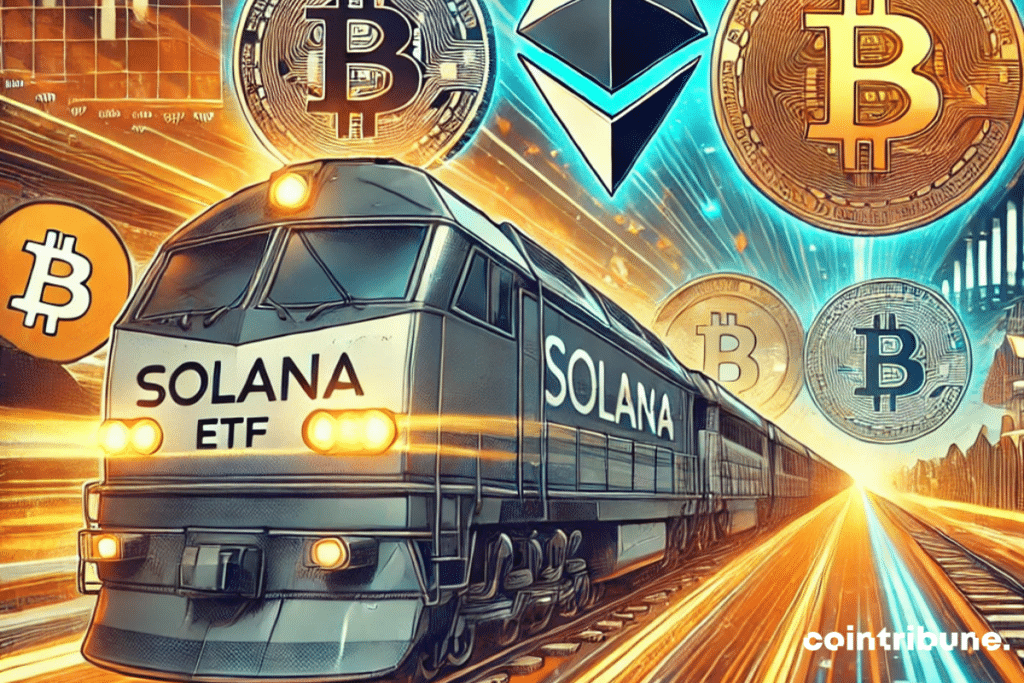14h10 ▪
4
min read ▪ by
While Bitcoin and Ethereum have paved the way for ETFs, it is now the crypto Sol that is about to write a new chapter. The SEC has just lit an unexpected fuse: the agency has triggered the countdown for the approval of a Solana ETF. A decision that smells of gunpowder, as it contrasts sharply with its hostile past. But behind this turnaround lie much deeper stakes than just a simple regulatory green light.


The SEC and crypto Sol
The SEC did not simply “receive” an ETF application for the crypto Solana. It has activated a binding process, with a deadline set for October 11. A move loaded with meaning.
By validating Grayscale’s 19b-4 form, the agency implicitly acknowledges that Solana is no longer this marginalized token, qualified as an unregistered security. From rejection to serious review, the course change is abrupt. As if Wall Street had forced open the doors of a closed club.
Just six weeks ago, the SEC demanded the withdrawal of a similar application. Today, analyst Eric Balchunas points out that we are navigating in “uncharted territory”.
An understatement. For behind this turnaround lies a broader legal battle: the qualification of crypto Sol as a security. By agreeing to study the ETF, the SEC admits that the debate deserves a platform — a rare concession, almost tactical.
For industry players, this evolution is not just a formality. It is a strong signal sent to institutional investors. “Solana has shifted from a toxic asset to a magnet for Wall Street,” summarizes Matthew Nay from Messari.
A renaissance that relies on explosive metrics: +318% real economic value (REV) in one quarter, a capitalization hovering around 91 billion dollars. Figures that hit like arguments.
The race for altcoin ETFs
Litecoin, the fork of the flagship crypto Bitcoin, is at the starting line. But Solana has a key advantage: a blazing ecosystem. Between decentralized applications and record revenues generated by validators, the blockchain is no longer just a simple infrastructure.
It is an autonomous economic ecosystem. An ETF would thus be not just a financial product, but a catalyst for a machine already in motion.
The real battle is being fought on legal grounds. By qualifying Solana as an unregistered security, the SEC had tried to stick a deadly label on it.
Today, the review of the ETF suggests a possible requalification. James Seyffart sees it as “a positive sign for exchanges in litigation with the SEC”. Translation: if crypto Solana wins, the entire category of altcoins breathes easier.
The path to approval remains fraught with obstacles. The five-phase process — publication in the Federal Register, public consultations, repeated reviews — can stretch over 240 days. A regulatory marathon where every day counts.
But the stakes go beyond timelines: a rejection could trigger lawsuits, as seen in Grayscale vs SEC in 2023. The game has only just begun despite the saturation of the crypto market.
Maximize your Cointribune experience with our “Read to Earn” program! For every article you read, earn points and access exclusive rewards. Sign up now and start earning benefits.


Fasciné par le bitcoin depuis 2017, Evariste n’a cessé de se documenter sur le sujet. Si son premier intérêt s’est porté sur le trading, il essaie désormais activement d’appréhender toutes les avancées centrées sur les cryptomonnaies. En tant que rédacteur, il aspire à fournir en permanence un travail de haute qualité qui reflète l’état du secteur dans son ensemble.
DISCLAIMER
The views, thoughts, and opinions expressed in this article belong solely to the author, and should not be taken as investment advice. Do your own research before taking any investment decisions.




